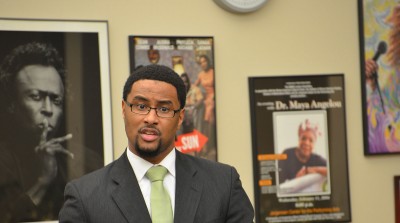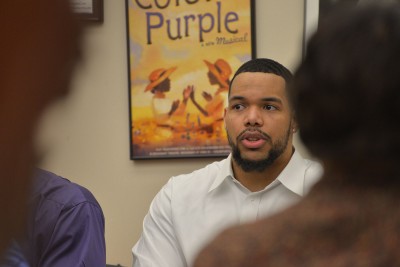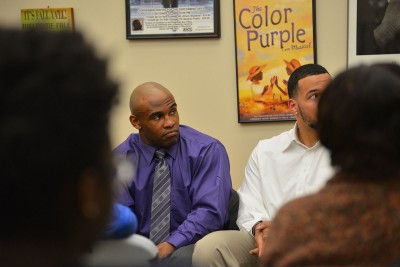Growing up in North Carolina and idolizing the likes of Michael Jordan and legendary college basketball coach Dean Smith, Joseph Cooper says he was not unlike many other kids raised in “basketball country” – throughout his childhood, he had his sights set on playing sports professionally. Even up until he started his undergraduate years at the University of North Carolina at Chapel Hill, Cooper dreamt of making it to the NBA.

Quickly realizing, however, that “it wasn’t going to be my career trajectory,” Cooper found himself at a loss. “I had an identity crisis when I stopped playing basketball,” he says. “I started to ask questions like: Why do individuals like me feel this way when a certain aspect of our lives is no longer salient?”
And although he struggled to pinpoint a major that felt right to him at the time – changing his mind nearly half a dozen times – Cooper began to find his footing through extracurricular involvement outside of the athletics realm.
Co-founding a minority service organization at UNC known as Gentlemen of Leadership and Distinction and Ladies of Virtue and Excellence (GOLD-N-LOVE), which is still active today, Cooper says: “I started to understand that I had skill sets outside of playing basketball, and really believing that. It’s one thing to possess those skills and to perform on them – and another thing to internally believe that you have value in that way.”
Ultimately, this emerging sense of self-discovery guided Cooper down a winding path to the world of academic research. Now an assistant professor of sport management at UConn’s Neag School of Education, Cooper is taking the same kinds of questions he long wrestled with and is not only exploring them through qualitative and mixed methods research studies – but also applying his findings directly in reaching out to young black male student-athletes who face the same stereotypes and stigmas he once encountered himself.
Valuing Student-Athletes – Beyond Athletics
Throughout his academic career, Cooper has focused on the experiences of black male student-athletes, uncovering the ways in which they are stigmatized as intellectually inferior within educational spaces, constrained to think of themselves as valued only in an athletics context.
“When I see a lot of students of color, particularly student-athletes of color, not feeling comfortable in educational spaces, I understand that, and I think that’s a big part of the disconnect taking place in our educational pipeline,” he says. In addition to many student-athletes of color lacking role models in the educational realm, he adds: “What I found through the research was that many black student-athletes weren’t involved in campus organizations. They aren’t getting the full college experience; it seems like they’re in a silo.”
“I just felt like there should be a space, something that is intentionally designed to take into account their unique experiences as black males and foster their holistic development.”
—Assistant Professor Joseph Cooper, founder of Collective Uplift
His work also exposes the stark differences between graduation success rates of black male student-athletes and their peers. According to data published by the NCAA this past fall, for instance, black male student-athletes are graduating at a disproportionately lower rate (65 percent) than that of white male student-athletes (85 percent) – a gap that has persisted over time. Cooper believes there are long-standing, systemic inequalities that play a role in these differences. “There’s a lot of exploitation of black student-athletes,” he says. “Ultimately, athletics is at the core of a lot of the decisions that are made.”

While Cooper acknowledges the dedication of UConn’s own athletics staff in supporting their students, he also feels there is an opportunity to offer targeted support for black male student-athletes to build on the current support systems within the athletics department.
“I just felt like there should be a space, something that is intentionally designed to take into account their unique experiences as black males and foster their holistic development,” he says.
A New Grassroots Effort
This past fall, Cooper turned that idea into an active outreach effort. He began reaching out to black male student-athletes at UConn, gathering them for weekly meetings as part of a new grassroots effort he calls Collective Uplift. The purpose behind Collective Uplift, Cooper says, is to empower, educate, and inspire ethnic minorities at UConn to maximize their full potential as holistic individuals, not exclusively in the realm of athletics, but also beyond.
The group – which now regularly comprises up to 10 UConn student-athletes of color – meets to discuss such topics as leadership development skills, resume building, and career options in the field of education, as well as to talk openly about their day-to-day experiences on campus and any other issues important to them.
“I’m not their coach; I’m not going to take away their scholarship. I’m not their advisor or professor; I don’t have control over their grades,” Cooper says. “They have a space to express themselves free of that type of judgment or any type of penalty. Ultimately, the goal is to help them view themselves as holistic individuals and nurture those holistic identities.”
Holistic development and empowerment, he says, are the core themes of Collective Uplift. “Those two things will facilitate their success in life – way beyond athletics.”

Yet keeping in mind the many hours these student-athletes must dedicate to their sport, Cooper offers them an analogy: “I tell them: The repetitions that you do with lifting weights, practicing your moves on the field, we need to be just as vigilant about repetition in developing you. Every week, this is our training session.”
Unlike similar organizations across the nation, such as the NCAA CHAMPS Life Skills program, which supports the development of student-athletes at several NCAA member institutions, Collective Uplift is unique in that it focuses specifically on the experiences of black male student-athletes.
“You’ve got to have a testimony. You’ve got to have something to speak to, a lived experience that informs why you feel the way you feel about certain things …”
—Assistant Professor Joseph Cooper, founder of Collective Uplift
Ultimately, Cooper says he would like to see this kind of support system adapted nationwide to serve the needs of other subgroups within University student-athlete populations. “There are some unique challenges that student-athletes of color are facing,” he says; just as other campus services are designed to meet the needs of specific groups of students, this program could likewise be “mimicked with the guidance of research on different subgroups.”
10,000 Hours
Cooper’s academic research has, undoubtedly, informed his approach to Collective Uplift. His findings over time have led him to outline what he refers to as holistic development principles – a set of six qualities he says play a key role in an individual achieving his or her goals. Originally termed by Cooper as critical success factors, these six qualities had consisted of personal development, social harmony, engagement with a strong support system, career aspirations, time management skills, and spirituality and/or organized religion. More recently, Cooper has coined them as holistic development principles, updating them to include the following components: self-identity awareness, positive social engagement, active mentorship, academic achievement, career aspirations, and balanced time management.

At the same time, he points to the importance of his own experiences in shaping his research interests – as well as in understanding the needs of Collective Uplift participants. “You’ve got to have a testimony,” he says. “You’ve got to have something to speak to, a lived experience that informs why you feel the way you feel about certain things and why you’re engaged in the type of work that you’re engaged in.”
For example, when Cooper talks about the critical success factor of personal development, he is quick to emphasize the influence of his mother, who encouraged Cooper and his brother, whom she raised alone, to stay involved in activities outside of sports.
“Whether I knew it or not, my mother definitely knew what she was doing. She was creating an identity for me, nurturing an identity that wasn’t connected to sport,” he says. “She knew that eventually the ball would go flat, the time on the clock would expire, and I would need to be prepared to excel in life outside of that.”
Cooper also remarks on the impact that the many books he has pored over throughout the years have had on his research ideas and his work with Collective Uplift. For instance, in reading best-seller Outliers by Malcolm Gladwell, Cooper says he began to consider an additional layer integral to the idea of time management.
“Gladwell talks about the idea that anybody who spends over 10,000 hours on something is an expert. I started to put that together,” Cooper says. “A lot of black males are celebrated for their athletic prowess … but a lot of that is just time spent on the activity. So if we can apply [in these student-athletes] that same mentality, that same time and effort and cultural support for academic endeavors, you’ll see the same success.”
Even as he continues to fine-tune the fundamentals of his six holistic development principles, Cooper shares his findings with the Collective Uplift participants, encouraging discussion around the ideas of academic achievement, career aspirations, and self-identity. The takeaway for these student-athletes, he hopes, is “to pay it forward, find their purpose and passion, and make a positive impact on the world. The more of us that are doing that, the less exploitation we’re going to see.”
For an insider’s look into Joseph Cooper’s ongoing efforts with Collective Uplift, check out this video.


